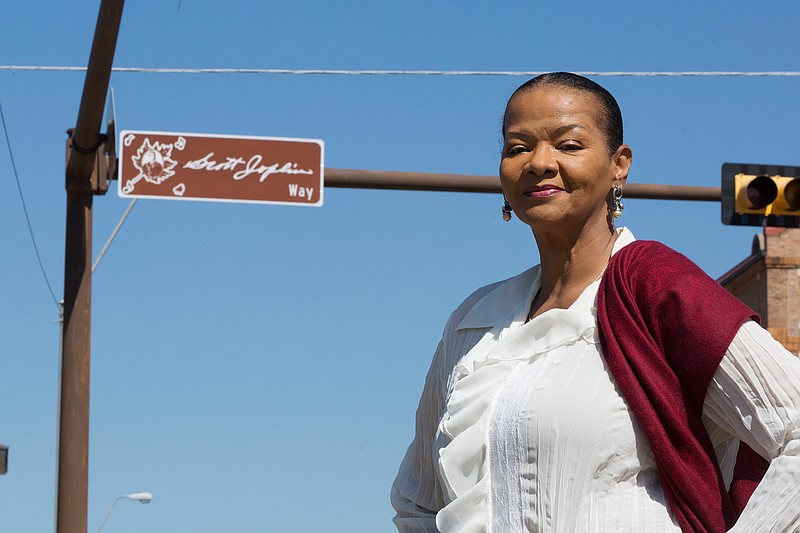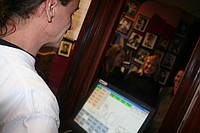Texarkana's rich musical history is much more than ragtime great Scott Joplin and the occasional visits by Elvis Presley.
Both of those celebrated aspects of the cities' musical heritage are integral to Texarkana's cultural life. Joplin learned the piano here on his way to becoming the king of ragtime music. Elvis rolled through town for shows at the Arkansas Municipal Auditorium as he became the undisputed king of rock 'n' roll.
Photo Gallery
The Looney Bin
A few of the party people at the Looney Bin on Wednesday, January 31 for Pat Godwin headlining act.
Joplin and Elvis's local ties will be lauded during the upcoming Scott Joplin International Centennial Celebration this Friday through Sunday, April 2, at the Perot Theatre and Silvermoon on Broad.
The Regional Music Heritage Center, a brainchild of David Mallette, has organized this festival to shine a spotlight on Texarkana's fascinating connections to musical history, including Joplin, the celebration's namesake.
Respected ragtime pianist Reginald Robinson will perform Joplin numbers during the SJICC, and look for Texarkana native and Grammy nominee Roseanna Vitro and other musicians to share jazz numbers just right for a Joplin celebration.
Also part of this celebration is an Elvis tribute artist, a homage to locals Dr. Carl "Cheesie" Nelson and Pat Cupp, and a European rockabilly band, the Texarkana Trio, coming to town. It's quite a lineup, replete with Texarkana music lore.
If you've recently traveled down Third Street in Texarkana, you may have seen some of that history on the street signs. A few of those blocks are now designated as "Scott Joplin Way."
From Oak Street on the Texas side to Hazel Street and the Arkansas Municipal Auditorium's Walk of Fame on the Arkansas side, Joplin signage is a way of mapping music history here. Carol Collins-Miles of the Scott Joplin Support Group and RMHC worked with both cities to make it happen.
"It is so important. We want to embrace our musical heritage," said Collins-Miles, calling Joplin a father of both ragtime and music here in Texarkana. "We're just exceedingly proud of the signs."
Starting near the Swampoodle Creek area is significant because what's called the Swampoodle bass line is famous with boogie woogie music, which has East Texas roots in Marshall. "Everyone knows it, everyone plays it," Collins-Miles said of that bass line.
The Swampoodle area downtown is where the music joints, bordellos and nightlife were situated here in town, Collins-Miles explained. It's where railroad patrons would eat, drink and "make merry," she said.
The 3rd Street Joplin signage is near the Jamison Building, too, which served as a center of African-American life in Texarkana. The building had a second floor auditorium for music performances, another connection to Texarkana cultural history.
Situated between Texas Boulevard and Main Street on 3rd Street is the Scott Joplin mural, Texarkana's boldest and most colorful homage to the pianist and composer's legacy. There's also the Perot Theatre, which has been so central to music history in Texarkana.
And, at State Line Avenue, 3rd Street runs past the Museum of Regional History, which features a piano that, it's believed, the young Joplin played while growing up in Texarkana. Texarkana's music history is explored in a music exhibit named after the Beasley family of local Beasley Music Company fame.
"It's a whole mapping plan going on here," Collins-Miles said about the route, which speaks to music history here.
Flagpole signage is up on the Arkansas side of town, Collins-Miles said, and on the Texas side the signs' visuals include a maple leaf, Joplin's portrait and even his own writing. "They found the authentic signature of Scott Joplin," Collins-Miles said.
Nelson, of course, is famous here as an early impersonator of Elvis. He stood in for Elvis at the AMA once when Presley ran late.
And Texarkana's Pat Cupp, only a teenager, was an early rockabilly pioneer with his band The Flying Saucers. Cupp and another noted local musician who achieved fame outside Texarkana, the jazzman Jay Franks, will receive plaques dedicated to their many musical contributions at the auditorium's Walk of Fame during the celebration.
Kicking back and talking rockabilly with Cupp is like rewinding time to the 195os as rock 'n' roll was taking shape, before it exploded into the behemoth musical genre it is now.
Cupp's story is amazing in a few respects, including his discovery, decades after recording rockabilly tunes and leaving that all behind, that he and rockabilly music had a cult following overseas. It brought him to England to play rockabilly about 40 years after he and his band hit it big with songs like "Long Gone Daddy."
The Flying Saucer Band did shows at the AMA, in Carthage, Texas, and on up into Oklahoma. They were popular within 200 or 300 miles of Texarkana, then moved on to more success.
"We got our break at the Louisiana Hayride in May of 1956," Cupp explained. They met record company owner Joe Bihari there, and so they got that break with Modern Records and its subsidiary, RPM. "We recorded for RPM after he heard us at the Louisiana Hayride."
Cupp remembers Roy Orbison was just coming out with his music at the time. Carl Perkins and Johnny Cash were on the scene.
"They were all coming to the Louisiana Hayride and that's why they stopped in Texarkana. It was a freebie deal for them," Cupp recalled about this easy stop on the circuit. Friday night shows at the AMA preceded Saturday shows at the Louisiana Hayride.
Ultimately, Cupp's label wanted him to head in a more rhythm-and-blues direction. Cupp didn't like that idea but did record some more music. Ultimately, though, he joined the Air Force to leave rockabilly and his label behind. "I was 18 but I was going on 42," he recalled about knowing the music business.
Rockabilly, he explains, was a short-lived genre, from 1955 to '57 or so. "That style of music, that's about how long it lasted," he said. In the Armed Forces, he went on to other types of music, and then played in a local jazz band for many years here in Texarkana with top musicians.
Then, at the age of 57, Cupp fielded a phone call from London. "And the promoter said, 'Mr. Cupp, we have a very big demand for you here,'" the rockabilly man recalled. "In Europe, your records have been going very, very well since 1970. And this was 1995." They couldn't understand why he wasn't performing there.
He'd though this interest was just a joke. But it wasn't. He ventured overseas after making sure his wife could come along for a vacation. In Hemsby, England, he played a show for thousands.
Cupp's considered how he feels about this honor. "I've tried to think of words that I could say that would be how I really felt, but haven't really been able to come up with them," he said. He thinks of all the people who were a part of this, not just himself, including the Flying Saucer bandmates who meant so much to him.
"All I can say is thank you, I feel great about it," Cupp said.
Lauretta Scott, daughter of jazz musician Jay Franks, feels the appreciation, too. For the longest time, she thought this day would never arrive, although before Franks passed he was honored with a Jay Franks Day in Texarkana.
Like Cupp, Franks will receive recognition during the Joplin celebration with an AMA Walk of Fame plaque. He holds a special place in Texarkana's music history.
"I'm elated, I'm happy, I'm overjoyed, I'm thrilled," Scott said, noting this recognition is "way overdue." When she talks about her father, his hard work and love for jazz music are readily apparent. He built his own home. He'd work during the day, then come home to be a father and play music at night.
"The whole community could probably hear him playing," Scott recalled. Growing up, her dad playing jazz was just what the family became used to hearing. As it was with Cupp, his music was recorded for Modern Records, a national label, in the 1950s with his band the Rockets of Rhythm. He played the alto sax and piano.
"But primarily he played the tenor saxophone," Scott said. It's the instrument played by John Coltrane, Lester Young and Stan Getz, some of the luminaries in the jazz world.
Franks and crew would get in their cars and drive to various places to play concerts. It was a convoy, his daughter recalled. "They would all get together and they would pack up and go," she said. Even though he was on a prominent label, Texarkana remained home.
The saxophonist also owned two local clubs: Club 82 and the Top Hat Club, two of the most popular clubs for African-Americans. "They would be packed every Friday and Saturday night, I know," Scott said. He also played to an integrated audience at the AMA during the 1950s. This was in the Jim Crow segregated South.
How would Franks feel about receiving this recognition? He'd feel gratitude.
"He would be so honored. He would be just overjoyed. I know he would. I can see a big smile on his face right now," his daughter said.
(On the Net: TexarkanaRMHC.org.)


